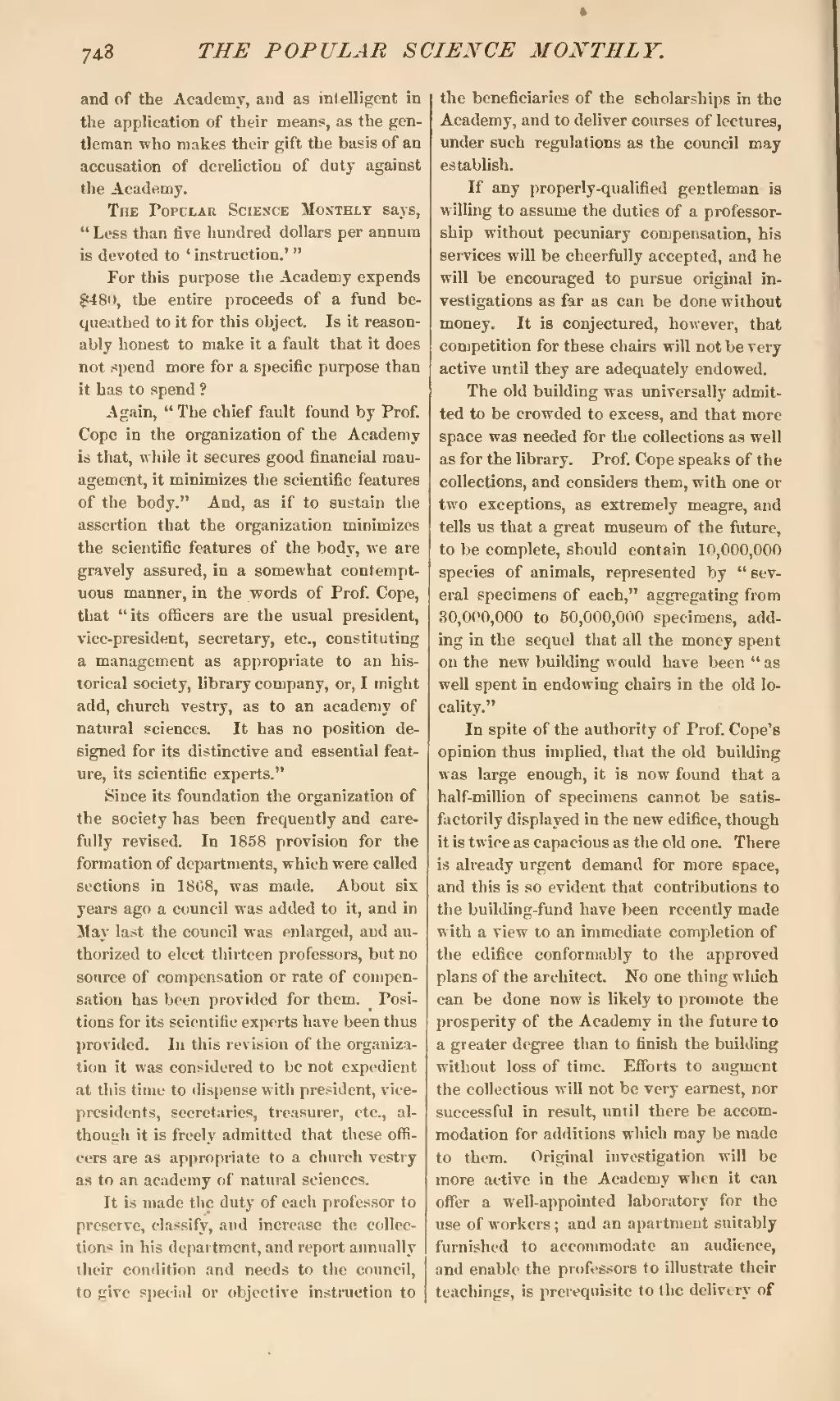and of the Academy, and as intelligent in the application of their means, as the gentleman who makes their gift the basis of an accusation of dereliction of duty against the Academy.
The Popular Science Monthly says, "Less than five hundred dollars per annum is devoted to 'instruction.'"
For this purpose the Academy expends $480, the entire proceeds of a fund bequeathed to it for this object. Is it reasonably honest to make it a fault that it does not spend more for a specific purpose than it has to spend?
Again, "The chief fault found by Prof. Cope in the organization of the Academy is that, while it secures good financial management, it minimizes the scientific features of the body." And, as if to sustain the assertion that the organization minimizes the scientific features of the body, we are gravely assured, in a somewhat contemptuous manner, in the words of Prof. Cope, that "its officers are the usual president, vice-president, secretary, etc., constituting a management as appropriate to an historical society, library company, or, I might add, church vestry, as to an academy of natural sciences. It has no position designed for its distinctive and essential feature, its scientific experts."
Since its foundation the organization of the society has been frequently and carefully revised. In 1858 provision for the formation of departments, which were called sections in 1868, was made. About six years ago a council was added to it, and in May last the council was enlarged, and authorized to elect thirteen professors, but no source of compensation or rate of compensation has been provided for them. Positions for its scientific experts have been thus provided. In this revision of the organization it was considered to be not expedient at this time to dispense with president, vice-presidents, secretaries, treasurer, etc., although it is freely admitted that these officers are as appropriate to a church vestry as to an academy of natural sciences.
It is made the duty of each professor to preserve, classify, and increase the collections in his department, and report annually their condition and needs to the council, to give special or objective instruction to the beneficiaries of the scholarships in the Academy, and to deliver courses of lectures, under such regulations as the council may establish.
If any properly-qualified gentleman is willing to assume the duties of a professorship without pecuniary compensation, his services will be cheerfully accepted, and he will be encouraged to pursue original investigations as far as can be done without money. It is conjectured, however, that competition for these chairs will not be very active until they are adequately endowed.
The old building was universally admitted to be crowded to excess, and that more space was needed for the collections as well as for the library. Prof. Cope speaks of the collections, and considers them, with one or two exceptions, as extremely meagre, and tells us that a great museum of the future, to be complete, should contain 10,000,000 species of animals, represented by "several specimens of each," aggregating from 30,000,000 to 50,000,000 specimens, adding in the sequel that all the money spent on the new building would have been "as well spent in endowing chairs in the old locality."
In spite of the authority of Prof. Cope's opinion thus implied, that the old building was large enough, it is now found that a half-million of specimens cannot be satisfactorily displayed in the new edifice, though it is twice as capacious as the old one. There is already urgent demand for more space, and this is so evident that contributions to the building-fund have been recently made with a view to an immediate completion of the edifice conformably to the approved plans of the architect. No one thing which can be done now is likely to promote the prosperity of the Academy in the future to a greater degree than to finish the building without loss of time. Efforts to augment the collections will not be very earnest, nor successful in result, until there be accommodation for additions which may be made to them. Original investigation will be more active in the Academy when it can offer a well-appointed laboratory for the use of workers; and an apartment suitably furnished to accommodate an audience, and enable the professors to illustrate their teachings, is prerequisite to the delivery of

